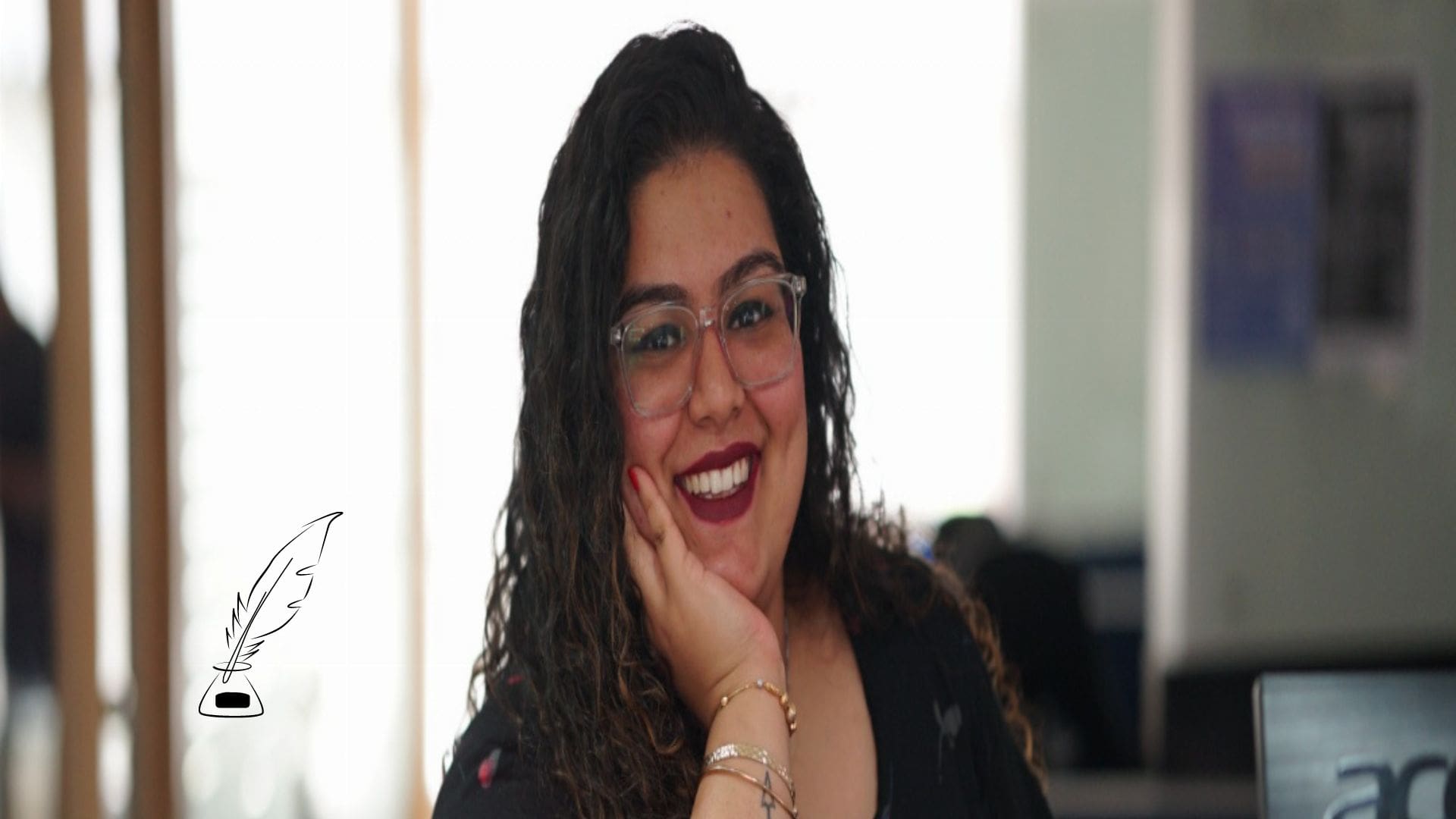Some say that she is incredibly talented, some call her writing unique, fun, and bold. Her colleagues & university peers believe that her curiosity, enthusiasm, and empathetic nature set her apart, and make her exceptional at what she does— copywriting.
In conversation with Namitha Muralinarayanan

Namitha Muralinarayanan
Meet Namitha Muralinarayanan, a content creator & copywriter.
I stumbled upon her LinkedIn profile while scouting writers whom we need to celebrate— writers whose journey will inspire others to grind, hustle, and shine.
I observed that Namitha had a very unique journey.
Her career trajectory was non-linear in the starting phase.
As per her LinkedIn profile, first, she worked as a business development executive. There, she was also involved with social media management. Next, she worked briefly in telemarketing & public relations (PR) roles, then did a gig or two as a freelance writer, and ever since she has been working as a full-time creative copywriter.
Another interesting highlight was that some of these jobs were for organizations based out of Dubai and some Bengaluru.
Such a diverse experience… and she is just 25.
Incredible, right?
Well, let’s hear from Namitha herself about her journey & learnings so far.
Hi Namitha, please provide a short introduction about yourself.
Hello, I’m Namitha, and currently, I wear the hat of a copywriter and content creator at a fintech company. My writing primarily revolves around crafting informative copy and compelling adverts. If not, I’d be knee-deep in crafting whitepapers, blogs, or articles.
Namitha, how did you gravitate towards writing? Passion? Destiny?
Well, growing up I was an extremely introverted, shy, socially anxious kid. I was around 7 or 8 years old when I first started reading Enid Blyton, Roald Dahl, Stephen King, and other wonderful authors. Reading them, I realized that to express emotions or convey something to another person sometimes all you need are words and a paper. I’d say that’s where my passion for both reading and writing started. There were a lot of twists and turns along the way for sure. In fact, during my Higher Secondary schooling years & Undergrad, I had no idea that writing was what I’d be doing professionally a few years down the line. But things always have a way of coming around, don’t they? And I’m glad it did. At this stage in my life, I would not give up writing both personally & professionally for the world.
Namitha, could you share how you landed your first writing job or published work?
After my undergraduate in commerce, I was more confused than ever about what I wanted to do with my career.
So I decided to take a year-long break to figure it out.
A few weeks after graduation, I landed a job as a sales representative for an event-organizing company in Dubai. And I can’t stress enough, how much I felt “I don’t belong here.”
However, I was fascinated by the creative & marketing department of the company.
One day during lunch, I overheard a member of the creative team share a problem that he was facing with the communication strategy. Without thinking I responded to him with an idea that I thought might work. He agreed that it was worth giving a shot.
Well long story short- it didn’t work.
But I got the creative team’s attention.
From then on I start helping out in strategies while still trying to achieve my sales targets.
That phase of my work life was probably the most stressful I had ever been.
But in hindsight that was for the best.
I learned two things.
One, work that involves creativity is my calling.
Two, I will never take up a sales job again.
Now, I realize that technically it wasn’t my first writing job, but to me it is. Helping out those writers and other creators is what taught me how difficult yet rewarding writing is.
Awesome! I had a similar experience and could relate to the extra stress that one has to bear while wearing multiple hats (esp. unofficial hats). Anyway, you mentioned being clueless after undergrad in commerce, also, you did mention how being a readaholic must have helped you become a better writer, but had you taken any formal writing courses or training to crack jobs?
Yes. I did my Master’s in Media where I specialized in Communication & Advertising. Within that, we had courses like creative writing, film studies, and theatre. That being said I am not suggesting that one will be a good writer only if they do a particular course. Being a good writer is much more than theory classes.
There is no shortcut to being a good writer. If you want to be a writer, ‘you must write’ that’s it.
That’s the only way.
It’s okay if your writing is shitty. Learn from it, develop ways to improve it, ask for feedback, and try again.
Always keep trying to improve the quality of your writing.
It’s also important to read what’s already out there.
You can only be a writer of the future if you know what has already been said, how was it said, why it worked, and who the writer was speaking to.
A few books that helped me be a better writer are-
- Made to Stick by Chip & Dan Heath
- Copy Logic by Michael Masterson & Mike Palmer
- Hey, Whipple, Squeeze This by Luke Sullivan
- The Idea Writers by Teressa Iezzi
Could you describe your writing process?
Okay, so I’ll answer for both, how I write for my company & how I write for myself.
At work, when I get a brief, the first thing I do is get all the available information about the requirements. This means going beyond the written brief. Understand from the client EXACTLY what they’re expecting and who are the target audience. Then I go to my writing desk and rewrite the brief & requirement in my own words. You can only write clear copy for a client when you can thoroughly explain the brief yourself. Then I take some time to think about what can be said to the audience that has already been said. Or how to make boring information sound interesting or other things along those lines depending on the brief. Only then do I start writing. If the requirement is of one copy. I always give three or four options. That way if the client suddenly asks “What more you got” I’ll have backup.
The process is much simpler when I’m writing for myself. My goal most of the time would be to either convey something to the reader or get things out of my chest. Either way, first I’ll write everything that flows to mind on a paper. Sometimes these wouldn’t even be proper sentences, they would just be words. Once everything is out there, I start fresh. I connect the dots, fill in the blanks, and make a sensible piece out of the words I threw at a paper.
As a writer, it’s important to know that fifty percent of our job is to think. Think about how to say what you need to say. Think about how will it benefit the reader. Think if you are the reader, will you like it? This applies more so to professional writing than to writing for self.
How do you manage work/life balance as a writer? Are there any specific strategies you’ve found effective?
This is a great question and I’ll tell you why.
As Indians, our brain is wired in a way that we think our job is done when we clock out of the office. We don’t realise as writers or creators we never clock out. I don’t mean that in a scary or alarming way. Think about it. The world runs on words. Everywhere you go – Ads, posters, movies, books. I’m not saying that writers have to work at all times. All I’m saying is, as a writer you can’t simply afford to not observe things around you. And honestly, if you have dreamed of being a writer or if you have been a writer for long enough, it’ll come naturally to you. So to your question, I think managing work and life is not that difficult as long as you put it in two separate yet very similar boxes (hahaha).
Writing can be both a passion and a stressor. How do you manage the mental health aspects of being a writer, such as dealing with isolation, anxiety, or writer’s block?
Being a writer is a beautiful yet kinda tricky journey. It’s this fine line between passion and stress. For me, though, I’ve figured out this sweet spot where my love for writing and keeping my sanity meet. You gotta find solace. Those long hours of just me and the words can get lonely, but I make it work. I like going on walks, a chat with friends, or just cozy up with a cup of coffee and a good book. When the stress of deadlines or writer’s block kicks in, I take a breather and I remind myself that creativity comes to you in its own time. Sometimes, you just gotta step back, let the ideas simmer, and trust the process. It’s all about balance, really. I’m big on self-care – gotta keep my mental health in check. Having a supportive group of people around helps. Stress, isolation, and writer’s block are all part of the gig, and it’s always important to come out on the other side with your sanity intact.
What are some day-to-day challenges you face at your writing job?
As a writer for a fintech company, essentially my job is to get people to consider financial tools that have been around for a long, long time. There is only so much you can say about one single thing. So to think and come up with ideas day after day sometimes gets to me. Another challenge that I often come across is the ever-changing financial rules. It is very crucial to check and recheck my writing to see that I’m not saying anything that can be used against the company. Writing for a financial company comes with a lot of rules and regulations so thinking out of the box will still be inside a bigger box of rules. I think it is always important to remember that facing difficulty coming up with ideas or rechecking your work a thousand times is normal and acceptable. More often than not, a necessity.
Rejection is a part of the writing profession. How do you deal with rejection, and what advice would you give to others facing it?
That’s very true. Being a writer and getting criticism for your writing goes hand in hand. The necessary thing to do when you face rejection is to keep an open mind. Always be ready to listen. Ask your client what exactly did they not like about your work. You also need to get clear, concise points on how you can make it better. When you get rejection it’s important not to take it too personally. That being said, sometimes you do get bummed out when you get rejections for a project you’ve worked hard on. When that happens, take a step back and leave your work alone for a little bit. Come back to it with a fresh mind.
How do you deal with “maza nahi aa raha,” feedback? 😀
Ah! Infamous feedback.
Well honestly, there is no fool-proof way to never get that feedback. The best thing you can do is, back up your work with enough research and data on why you think your way would work for the campaign or any other project you’re working on.
Even then, that’s a feedback you’ll probably hear that feedback a lot. Hear them out, and see what kind of “maza” are they looking for. Rework, and give them options to choose from. Always give them options.
What are some common pitfalls and misconceptions about being a writer that you believe aspiring writers should be aware of?
One common pitfall for aspiring writers is the romanticized notion of instant success and widespread recognition.
Many believe that writing is a shortcut to fame and fortune, but the reality is that it often requires perseverance, patience, and continuous improvement. Writing is a craft that evolves over time, and success is usually a result of consistent effort, revisions, and a genuine love for the process.
Another misconception is-
Writing is a solitary work.
While the act of putting words on paper may be solitary, the journey to becoming a successful writer often involves collaboration, feedback, and a supportive community. Seeking constructive criticism, networking with other writers, and staying open to learning from diverse perspectives can significantly contribute to my growth as a writer. Understanding these realities can help aspiring writers navigate the challenges and enjoy a sustainable creative journey.
Were you satisfied with the compensation you received for your writing work? If not, what strategies do you think could help command a higher salary as a beginner writer?
Initially, I did face challenges with the compensation for my writing work.
However, I quickly realized the importance of valuing my skills and setting realistic expectations. To ask for a higher salary, it’s important to build a strong portfolio showcasing your best work and continually improving your craft.
- Confidence in your abilities can be a game-changer.
- Networking is also key.
Don’t hesitate to negotiate and express the value you bring to the table. Connect with fellow writers, editors, and professionals in the industry. Building meaningful relationships can open doors to better opportunities and higher-paying gigs.
Stay persistent, stay passionate, and believe in the worth of your words.
Many writers struggle with the financial aspects of their careers. What advice do you have for managing finances as a full-time writer, freelance writer, or author, especially in terms of diversifying income streams?
In your opinion, what traits make a writer successful and potentially high-earning in today’s market?
In today’s ever-changing writing landscape, adaptability and versatility are key traits that can elevate a writer to success and potentially higher earnings.
Successful writers often embrace change, whether it’s adapting to new writing styles, exploring diverse genres, or staying updated on digital trends. The ability to pivot and cater to the evolving demands of the market positions a writer for long-term success.
Moreover, cultivating a strong personal brand and building a dedicated online presence is necessary.
Engaging with your audience through social media and consistently delivering quality content not only establishes credibility but also opens up opportunities for lucrative collaborations and partnerships.
The importance of diversity in writing and literature has been increasingly recognized. How do you approach incorporating diversity into your work, and why do you think it’s important?
Incorporating diversity into my work is a fundamental aspect of my writing process.
I approach it by consciously seeking to represent a range of voices, perspectives, and experiences in my stories. This involves research, empathy, and a commitment to understanding the nuances of different cultures, backgrounds, and identities.
I believe that creating diverse narratives not only reflects the richness of the world we live in but also fosters a more inclusive and empathetic literary landscape.
Importantly, diversity is not just a checkbox; it’s a recognition of the myriad stories that deserve to be told.
In today’s digital age, how important is personal branding for a writer?
While I’m still in the process of honing my own brand, I understand that establishing a distinct online presence is crucial to stand out from a crowd.
I’ve started by creating a professional website to showcase my work and share my writing journey (it’s still a work in progress).
Additionally, I also show my active presence on social media platforms to engage with readers and fellow writers.
How important is being part of a writing community or network for your growth and opportunities? Do you have any tips for writers looking to build their network?
Being part of a writing community or network is immensely valuable for personal and professional growth as a writer. The exchange of ideas, feedback, and support within a community creates an environment conducive to learning and honing one’s craft. Networking opens doors to opportunities, such as collaborations, mentorships, and exposure to different writing styles and genres. It provides a sense of belonging and motivation, encouraging writers to push their boundaries and strive for excellence. For writers looking to build their network, my advice is to actively engage with existing communities both online and offline. Participate in writing forums, attend local literary events, and connect with fellow writers on social media platforms. Don’t be afraid to share your work and ask for feedback. Also, reciprocate by supporting others in the community, whether through critiques, sharing resources, or simply offering encouragement. Building a network is a two-way street, and the relationships you cultivate can be a source of inspiration, guidance, and potential collaborations throughout your writing journey.
How do you stay adaptable and continue to grow in a constantly evolving writing landscape?
What books, online blogs, or social media influencers do you recommend to aspiring writers looking to grow in their careers?
With the constant evolution of technology, how do you incorporate new tools or platforms into your writing process? Are there any specific technologies or software that have transformed the way you write?
Integrating tools and platforms in my writing process is more a necessity than a choice in this ever-changing technology-driven era.
Cloud-based tools like Google Workspace have revolutionized the way I collaborate with colleagues, providing a virtual space for real-time edits and efficient teamwork, irrespective of geographical constraints.
In addition to these, incorporating AI-driven writing assistants like Grammarly and ProWritingAid has become a game-changer. These tools not only polish my grammar but also offer valuable insights for enhancing my overall writing style and clarity.
The versatility of multimedia integration is another aspect that tools like Canva and Adobe Spark bring to the table, allowing me to craft client-specific appealing content effortlessly.
How do you view the role of AI writing tools in the writing profession? Do you use them, and if so, how do they integrate into your workflow?
The role of AI writing tools in today’s writing scene is undeniably significant, offering efficiency and support in various aspects of the creative process. Tools like ChatGPT showcase the incredible potential of AI, providing quick insights, generating ideas, and even refining grammar and style. These tools can be a valuable resource, especially when time is of the essence or when a fresh perspective is needed.
However, while I acknowledge the benefits of AI writing tools, I prefer the human touch in my writing. There’s a certain flair, nuance, and intuition that comes from human expression that AI tools may not capture entirely.
Writing is not just about constructing sentences; it’s about infusing emotion, personal experiences, and unique perspectives into the words. While AI tools can certainly assist, they might miss the nuanced subtleties that make human writing truly distinctive.
Are there any traps, scams, or misleading advice you’ve encountered that you would caution other writers against?
One thing to watch out for in the world of copywriting is the promise of “overnight success” or “guaranteed results.”
There’s no magical shortcut to becoming a great copywriter.
Some individuals or courses may make enticing claims, but the reality is that writing compelling content takes time, practice, and a deep understanding of your audience.
Be wary of anyone promising instant fame or wealth through writing – it’s usually too good to be true.
Another pitfall is falling for services that claim to generate content using advanced AI without human input. While AI tools can be helpful, there’s no substitute for the creativity and nuance that a human writer brings. Authenticity and a genuine connection with your audience are crucial in effective copywriting.
Always be discerning and choose opportunities that prioritize real skills and a commitment to continuous improvement over flashy but empty promises.
Looking back on your career, is there anything you would do differently to improve your career trajectory?
Looking back at my career, I’d say the main thing I’d do differently is start networking sooner.
In the early stages of my career, I underestimated the power of building professional relationships.
Connecting with corporate leaders, mentors, and others in the industry not only provides valuable insights but also opens up doors to new opportunities. I’ve come to realize that a supportive professional network is like a safety net, offering advice, or even potential career advancements.
What are your future goals and aspirations as a writer? How are you working towards achieving them?
My aim is to collaborate with diverse clients and projects to broaden my experience and bring fresh perspectives to my work. I believe, building a strong portfolio that showcases my versatility and creativity is crucial to grow in this field that I have chosen.
How can employers, businesses, or fellow writers reach out to you for work or collaboration?
You can find me on LinkedIn, connect with me on Instagram at nami_172, or follow me on Twitter. Alternatively, feel free to drop me an email at 19namitha98@gmail.com. I’m looking forward to connecting and exploring potential projects together.
Thank you so much, Namitha. For this candid interview. For sharing your journey. For honest answers.
May you achieve your writing goals, and become the impactful writer that you aspire to be.




